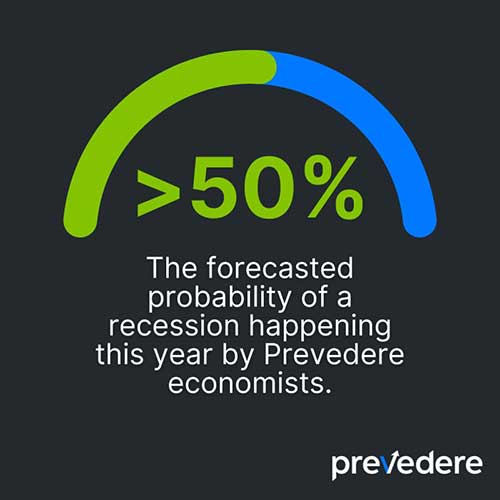Artificial intelligence and machine learning bring back confidence to manufacturing leaders.
By Rich Wagner, CEO and Founder, Prevedere
The COVID-19 pandemic highlighted the importance of the U.S. manufacturing sector as a foundational piece of the global economy as pandemic-related supply disruptions and heightened demand placed a substantial burden on consumers, retailers and logistics managers alike. Prior to COVID-19, manufacturers had ample flexibility to respond quickly to customer needs and deliver timely solutions, but after COVID, manufacturers are struggling to maintain good supplier-buyer relationships due to canceled orders and renegotiated contracts, which, in turn, negatively affects service quality and customer satisfaction.
Many of the challenges faced by manufacturers today are directly tied to rapidly changing external economic factors that make it extremely hard for business leaders to strategically plan. According to Harvard Business Review, 85% of business performance is influenced by external factors, yet many businesses don’t utilize external indicators in their financial planning and forecasting processes.
Artificial intelligence (AI) and machine learning (ML) can be leveraged to identify and combine the best leading drivers which predict future performance in a highly volatile setting. By monitoring external economic indicators to identify which macroeconomic indicators and industry factors are relevant, then figuring out how to incorporate the cause and effect variables into forecasts and plans, supply chain professionals can maintain logistics flexibility during periods of supply chain stress and channel disruptions as well as improve performance during periods of rapid growth.

Consumer demand and supply chain issues can be difficult to predict – especially if business leaders are not monitoring the right information. Diligent leaders need to identify highly relevant, external indicators that drive business performance – a sizable feat when considering the vast quantity of data available. This is where AI and ML come into play. Using AI and ML for demand forecasting equips leaders with the data analytics capabilities required to identify the drivers that most affect their business, along with the algorithmic modeling to contextualize the information for a better understanding of performance and market predictions.
These models can provide upside, baseline and downside predictions creating 12 to 18-month flexible forecasts and much-needed breathing room for leaders to utilize in their planning processes.
For example, organizations that currently use predictive planning technology are able to monitor the critical indicators that reflect the current business cycle for a better understanding of exactly when a recessionary period will hit next year. While all business leaders are aware that an impending recession is on the way, AI and ML can not only predict timing more accurately, but can help build a contingency plan by examining best and worst-case scenarios for the recession.
Contingency planning helps answer business leaders’ “what-if” questions by simulating the optimistic, pessimistic and baseline scenarios to reduce the margin for error in business strategy development – an imperative for catching near-sided blind spots in a volatile economy.
Leaders who utilize AI and ML also have the added benefit of time. With at least a quarter’s notice for potential economic change, predictive planning technology creates a cushion for decision-makers to fine-tune and adjust their financials for steady navigating through uncertainty.
The combination of the data and the modeling can also be leveraged to validate plans and strategies, not just create them. Building confidence in business leaders, and therefore their financial plans, is a benefit that cannot be overstated.
Even when utilizing AI and ML to create accurate business models, impartial insights given by a human economist – whether on a predictive technology platform or in spoken conversation – adds an additional layer of expertise and understanding. Human economists have the ability to help leaders interpret the data and can advise on market shifts and the associated risk and opportunity. This combination of impartial insights is leveraged by more strategic CFOs and FP&A, as well as more operational planners from supply chain management, to better understand their most impactful business drivers and how to validate any plans and strategies with economic and industry predictions.
Predictive planning helps manufacturers prepare for changes in supply and demand, reducing margins and working capital. By monitoring real-time data, implementing flexible forecasts, and utilizing contingency planning, business leaders can then make more strategic business decisions to maximize capacity and minimize risk exposure, even through unprecedented market volatility.
The importance of intelligent forecasting is not limited to times of uncertainty. As the post-pandemic economy evolves, business leaders should utilize artificial intelligence and machine learning to understand how historical relationships may have changed and then implement a predictive planning process that adjusts to shifts in the underlying business cycle.

Scott Ellyson, CEO of East West Manufacturing, brings decades of global manufacturing and supply chain leadership to the conversation. In this episode, he shares practical insights on scaling operations, navigating complexity, and building resilient manufacturing networks in an increasingly connected world.